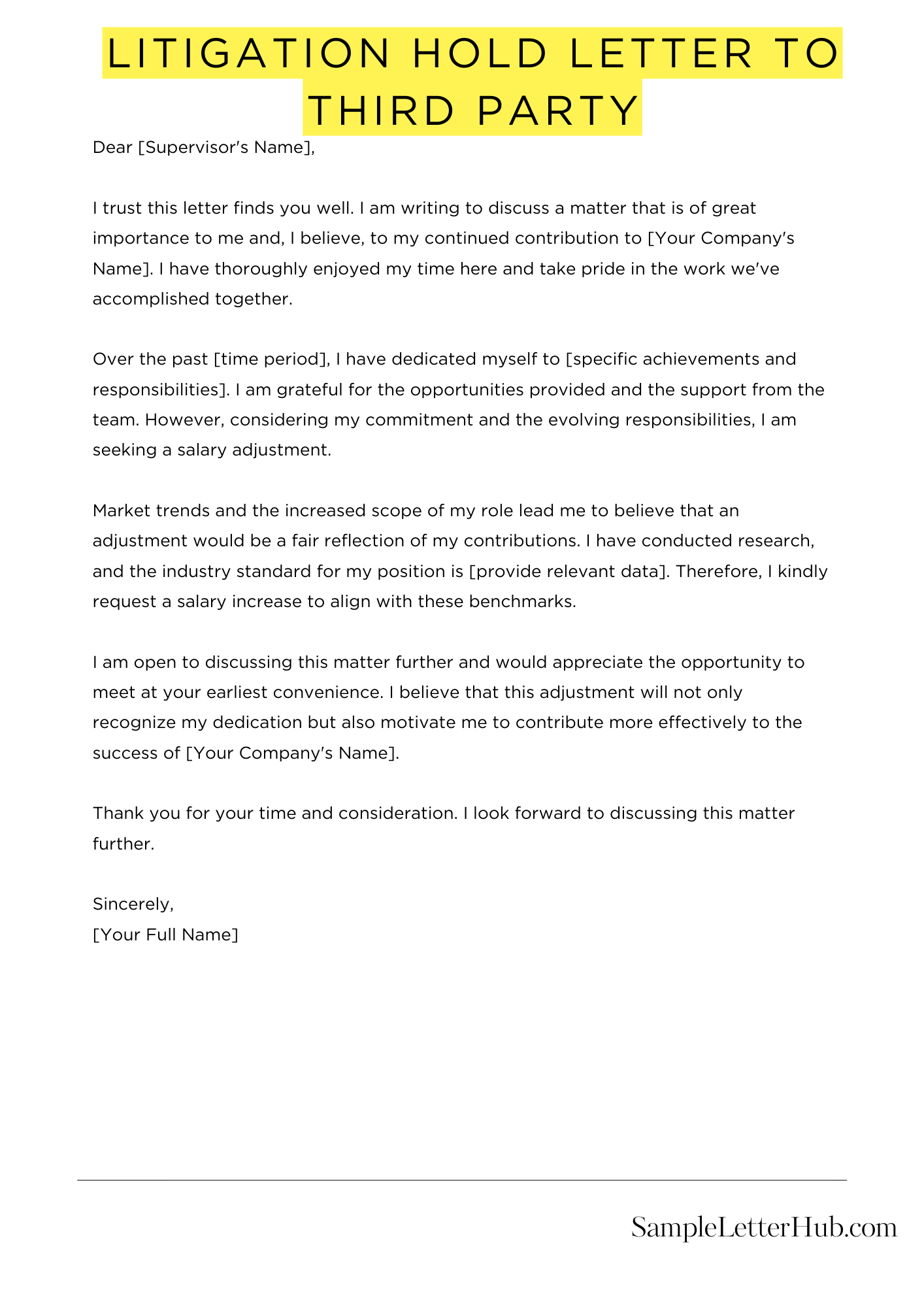A litigation hold letter to a third party is a formal request to preserve and maintain relevant documents and information that may be relevant to a potential or ongoing lawsuit. It is typically sent to individuals or organizations that may have possession of or access to such materials. The purpose of the letter is to prevent the destruction or alteration of evidence that could be crucial to the case.
In this article, we will provide you with templates, examples, and samples of litigation hold letters to third parties. These resources will help you draft a clear and effective letter that outlines the specific documents and information that need to be preserved. By using these templates, you can save time and ensure that your letter complies with legal requirements.
Litigation Hold Letter to Third Party
Dear [Recipient Name],
Please be advised that [Your Company Name] is currently involved in litigation involving [Case Name]. As part of our legal obligations, we are issuing this Litigation Hold Notice to preserve all documents, electronic records, and other information that may be relevant to this matter.
This notice applies to all documents and records in your possession, custody, or control that relate to [Case Name]. This includes, but is not limited to:
* Emails
* Text messages
* Instant messages
* Social media posts
* Physical documents
* Electronic files
* Backups
Please take immediate steps to:
* Suspend the destruction or alteration of any relevant documents.
* Identify and preserve all relevant documents, including electronic records.
* Segregate and secure these documents from routine destruction or alteration.
* Notify us promptly of any changes in the location or status of these documents.
Your cooperation in complying with this Litigation Hold Notice is essential to ensure the preservation of evidence and the integrity of the legal proceedings. Please acknowledge receipt of this notice by signing and returning the enclosed copy.
If you have any questions or require further clarification, please do not hesitate to contact us.
Thank you for your attention to this matter.
Sincerely,
[Your Name]
How to Write a Litigation Hold Letter to a Third Party
A litigation hold letter is a formal request to a third party to preserve all documents and information that may be relevant to a pending or anticipated lawsuit.
Purpose of a Litigation Hold Letter
The purpose of a litigation hold letter is to prevent the destruction or alteration of evidence that may be crucial to the case.
When to Send a Litigation Hold Letter
A litigation hold letter should be sent as soon as possible after a lawsuit is filed or when there is a reasonable anticipation of litigation.
Who to Send a Litigation Hold Letter To
A litigation hold letter should be sent to any third party who may have relevant documents or information, such as:
- Former employees
- Current employees
- Vendors
- Customers
- Insurance companies
What to Include in a Litigation Hold Letter
A litigation hold letter should include the following information:
- The name of the case
- The court in which the case is filed
- The case number
- The name of the third party
- A description of the documents and information that are being requested
- A statement that the third party is required to preserve all relevant documents and information
- A statement that the third party may not destroy or alter any relevant documents or information
- A statement that the third party must cooperate with the discovery process
- A signature block

How to Serve a Litigation Hold Letter
A litigation hold letter can be served in person, by mail, or by email.
Consequences of Failing to Comply with a Litigation Hold Letter
If a third party fails to comply with a litigation hold letter, they may be subject to sanctions, including:
- Monetary penalties
- Adverse inferences
- Default judgment
FAQs about Litigation Third Party
1. What is a third party in a legal case?
A third party is an individual or entity that is not directly involved in a legal dispute but may have an interest in the outcome of the case.
2. What are the different types of third parties in a legal case?
There are several different types of third parties in a legal case, including:
– Witnesses: Individuals who have information about the case.
– Experts: Individuals who have specialized knowledge or experience that can assist the court in understanding the case.
– Intervenors: Individuals or entities that have a legal interest in the outcome of the case and are permitted to participate in the proceedings.
– Amici curiae: Individuals or entities that are not directly involved in the case but are permitted to submit legal arguments to the court.
3. What are the rights of third parties in a legal case?
The rights of third parties in a legal case vary depending on their specific role in the case. However, all third parties have the right to be treated fairly and to have their interests considered by the court.
4. What are the obligations of third parties in a legal case?
The obligations of third parties in a legal case also vary depending on their specific role in the case. However, all third parties have an obligation to cooperate with the court and to provide truthful information.
5. What are the consequences of failing to comply with the obligations of a third party in a legal case?
The consequences of failing to comply with the obligations of a third party in a legal case can vary depending on the specific circumstances of the case. However, potential consequences include being held in contempt of court, being ordered to pay damages, or being barred from participating in the case.

